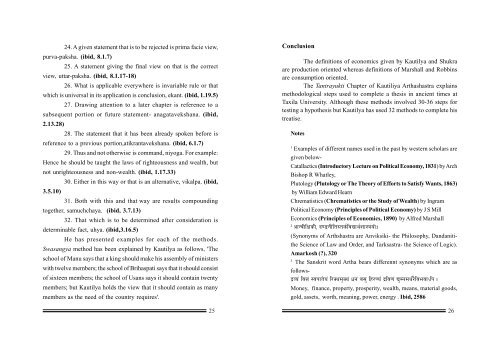Economics of Kautiliya Shukra and Brihaspati.pmd
Economics of Kautiliya Shukra and Brihaspati.pmd
Economics of Kautiliya Shukra and Brihaspati.pmd
You also want an ePaper? Increase the reach of your titles
YUMPU automatically turns print PDFs into web optimized ePapers that Google loves.
24. A given statement that is to be rejected is prima facie view,<br />
purva-paksha. (ibid, 8.1.7)<br />
25. A statement giving the final view on that is the correct<br />
view, uttar-paksha. (ibid, 8.1.17-18)<br />
26. What is applicable everywhere is invariable rule or that<br />
which is universal in its application is conclusion, ekant. (ibid, 1.19.5)<br />
27. Drawing attention to a later chapter is reference to a<br />
subsequent portion or future statement- anagatavekshana. (ibid,<br />
2.13.28)<br />
28. The statement that it has been already spoken before is<br />
reference to a previous portion,atikrantavekshana. (ibid, 6.1.7)<br />
29. Thus <strong>and</strong> not otherwise is comm<strong>and</strong>, niyoga. For example:<br />
Hence he should be taught the laws <strong>of</strong> righteousness <strong>and</strong> wealth, but<br />
not unrighteousness <strong>and</strong> non-wealth. (ibid, 1.17.33)<br />
30. Either in this way or that is an alternative, vikalpa. (ibid,<br />
3.5.10)<br />
31. Both with this <strong>and</strong> that way are results compounding<br />
together, samuchchaya. (ibid, 3.7.13)<br />
32. That which is to be determined after consideration is<br />
determinable fact, uhya. (ibid,3.16.5)<br />
He has presented examples for each <strong>of</strong> the methods.<br />
Swasangya method has been explained by Kautilya as follows, 'The<br />
school <strong>of</strong> Manu says that a king should make his assembly <strong>of</strong> ministers<br />
with twelve members; the school <strong>of</strong> <strong>Brihaspati</strong> says that it should consist<br />
<strong>of</strong> sixteen members; the school <strong>of</strong> Usans says it should contain twenty<br />
members; but Kautilya holds the view that it should contain as many<br />
members as the need <strong>of</strong> the country requires'.<br />
25<br />
Conclusion<br />
The definitions <strong>of</strong> economics given by Kautilya <strong>and</strong> <strong>Shukra</strong><br />
are production oriented whereas definitions <strong>of</strong> Marshall <strong>and</strong> Robbins<br />
are consumption oriented.<br />
The Tantrayukti Chapter <strong>of</strong> <strong>Kautiliya</strong> Arthashastra explains<br />
methodological steps used to complete a thesis in ancient times at<br />
Taxila University. Although these methods involved 30-36 steps for<br />
testing a hypothesis but Kautilya has used 32 methods to complete his<br />
treatise.<br />
Notes<br />
1 Examples <strong>of</strong> different names used in the past by western scholars are<br />
given below-<br />
Catallactics (Introductory Lecture on Political Economy, 1831) by Arch<br />
Bishop R Whatley,<br />
Plutology (Plutology or The Theory <strong>of</strong> Efforts to Satisfy Wants, 1863)<br />
by William Edward Hearn<br />
Chrematistics (Chrematistics or the Study <strong>of</strong> Wealth) by Ingram<br />
Political Economy (Principles <strong>of</strong> Political Economy) by J S Mill<br />
<strong>Economics</strong> (Principles <strong>of</strong> <strong>Economics</strong>, 1890) by Alfred Marshall<br />
2 cfGjLlIfsL, b08gLlt:ts{ljBfy{zf:q<strong>of</strong>]M.<br />
(Synonyms <strong>of</strong> Arthshastra are Anviksiki- the Philosophy, D<strong>and</strong>anitithe<br />
Science <strong>of</strong> Law <strong>and</strong> Order, <strong>and</strong> Tarksastra- the Science <strong>of</strong> Logic).<br />
Amarkosh (?), 320<br />
3 The Sanskrit word Artha bears differennt synonyms which are as<br />
followsb|Jo+<br />
ljQ+ :jkft]o+ l/Syd[Sy+ wg+ j;' lx/0o+ + b|lj0f+ B'Dgdy{/}ljejf˜lk .<br />
Money, finance, property, prosperity, wealth, means, material goods,<br />
gold, assets, worth, meaning, power, energy . Ibid, 2586<br />
26


